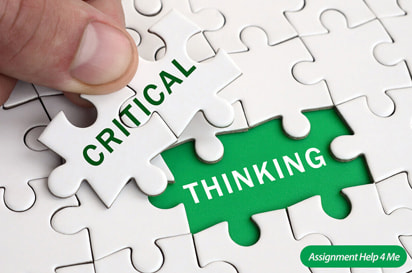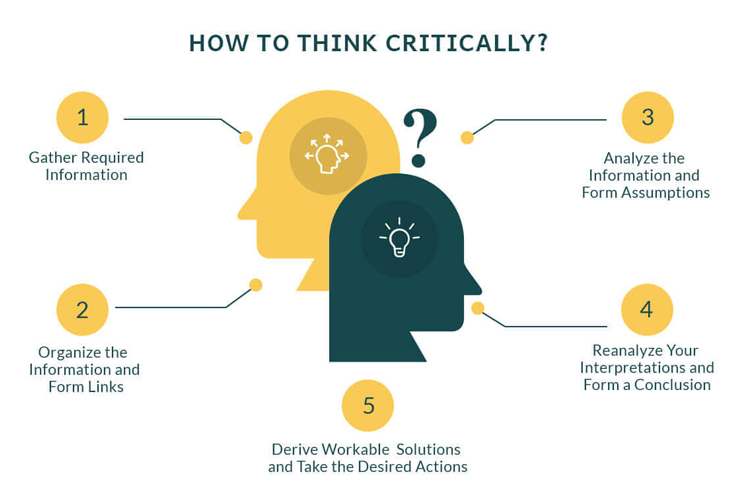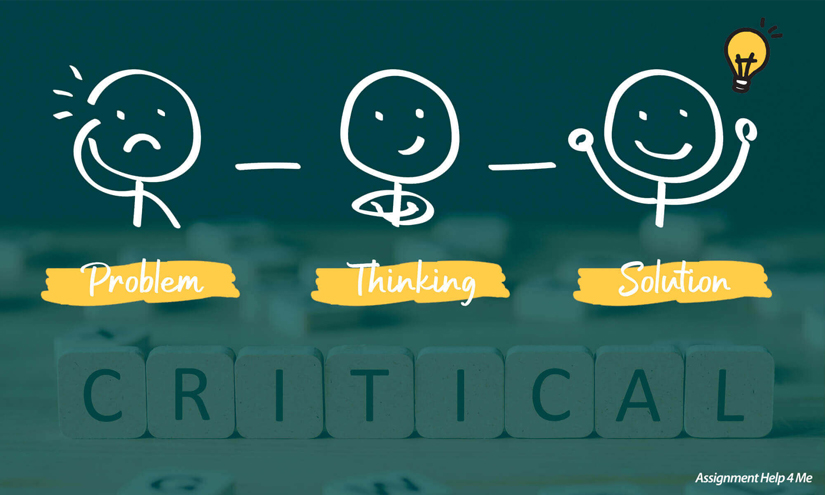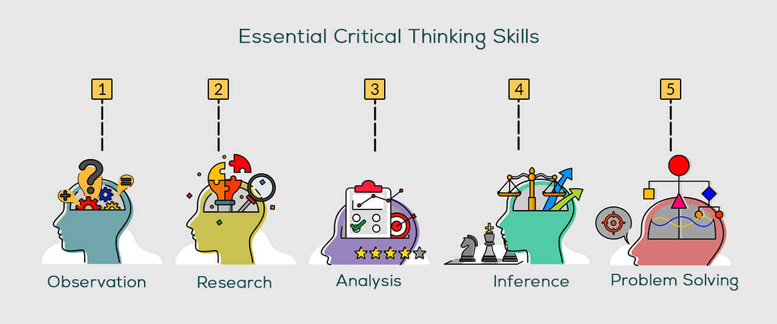
Contents
A detailed, pensive and useful guide on critical thinking

Today’s world needs people who can think of innovative solutions to the existing problems in different domains of life. There is no need for human encyclopedias who can only memorize facts and figures as anyone can find such information on the internet with a single click. Also, the world of business has become too competitive in nature. Business organizations are now looking for individuals who can bring innovation to their companies. They want people who can think and utilize their knowledge to generate new product ideas, plans for business growth and expansion. This implies that mere rote learning cannot serve students like you. You need to learn to utilize your thinking power for innovative purposes and enhancing your critical thinking skills is the best way to do that. Now, you may have various questions running through your mind. What does critical thinking mean? How to learn thinking critically? and so on. This detailed guide is meant to answer all these questions for you. It’ll help you understand all about critical thinking in detail. So, young minds, get ready to explore the world of critical thinking with us. Let’s begin by discussing what is meant by critical thinking.
Critical thinking is all about great decision-making and doing the right things at the right time. One crucial decision for your academic success is to choose the right assignment help resource when you have multiple assignments to complete against the run of approaching deadlines. So, in such times, it would be a smart decision to avail our Instant Assignment Help services. We are committed to serving students all across the globe and assist them in their pursuit of excellence and success. From research work to dissertation to homework, we cater to multiple student requirements and we are a trusted brand for quality and genuineness. You can reach out to us at any time for Online Assignment Help. Good luck with your future endeavors!
What is critical thinking?
According to Richard Aram, New York University sociology professor, critical thinking is the ability to cross-examine evidence and argument to sift through all the noise. To put his words in simple terms, critical thinking is the ability to analyze information clearly and reach meaningful conclusions. This means that as a critical thinker, you do not accept every piece of information that comes your way as it is. Rather, you apply your brainpower to break the information into various components, examine and conclude whether the facts stated are true or false. This implies that critical thinking enables you to look at things in your own way, rather than simply accepting what someone else has said. Moreover, as a critical thinker, you do not take things at the face value. Rather, you dig deeper to analyze if things are actually how they appear to be at the surface or not.
So, to sum up, critical thinking enables you to learn things in an active manner. You no longer behave as a passive recipient of information. But, you jump into analysis and try to understand everything in detail. This habit of understanding things in detail further helps you comprehend your problems well too. Once you know the problem well, you can easily find an innovative solution to it. This is because as highlighted by Stanley Arnold, “ Every problem contains within itself the seeds of its own solution.” This way, critical thinking broadens your thought process and helps you become individuals who can actually make use of their knowledge for practical purposes.
How to think critically?

Critical thinking is an art. You can master this art through consistent practice. But, before you can begin practicing, it is important to know the basic steps involved in the critical thinking process. Once you understand these basic steps, you can follow them to practice critical thinking. So, now let’s begin to discuss the basic steps involved in the critical thinking process.
Gather required information
To solve any problem, firstly, it is important to gather the required information related to it. For example, let us consider that your problem is a lack of concentration while studying. Then, you have to gather information regarding the factors that might be responsible for the same. Lack of interest, lack of sleep, distractions like smartphones, laptops, etc. are examples of factors that might be responsible for your lack of concentration during study time. So, your first step on the path of critical thinking is to gather the required information. You may gather it in a number of ways depending upon the situation. If we consider the same example of lacking concentration while studying, then, introspection is your way towards gathering the information related to the problem. But, if the problem is external to you, then you may have to utilize resources like the internet, surveys, and data collection to gather the required information.
Organize the information and form links
Once you have gathered the required information, it is important to form links between related factors. If we consider the same example as mentioned above, then lack of interest and distractions are two factors that can be clubbed together. Your lack of interest in studies might be fueling your urge to use your smartphone which can be why you lack concentration while studying. So, you can keep them both in one category i.e. lack of interest. Now you see how you can link different pieces of information and gradually narrow your area of focus to find the right solution.
Analyze the information and form assumptions
Once you have sorted the information, you have to analyze it and form assumptions. Let’s continue with the same example as mentioned above. We have now reached a point where your focus has narrowed down to two factors that might be responsible for your lack of concentration while studying i.e. lack of sleep and lack of interest. Now, you have to analyze which of these factors holds a major share in your problem. For now, let us consider that your analysis says that lack of interest is the factor that is actually responsible for your lack of concentration.
Reanalyze your interpretations and form a conclusion
At this step of the critical thinking process, you have to re-analyze your interpretations. This means that you have to go through each step of the critical thinking process and see if you reach the same interpretation again. If yes, then, you are ready to conclude the problem. If we consider the same example, then, you can conclude that lack of interest is the reason why you cannot concentrate properly on your studies.
Derive workable solutions and take the desired actions
After concluding the actual problem, you are ready to move towards one of the most important steps of the critical thinking process. It is to derive workable solutions to your problem and take the desired actions. With regard to the example, we have considered, gamification of learning, using colored pens for note-making, and studying with the help of YouTube videos are some examples of workable solutions. You can derive these solutions by searching the internet or consulting other resources like books, your family members, etc. Once you have got a list of workable solutions, then, you can select the ones which you would like to implement and take the desired actions.
Now that you have been acquainted with the step-by-step process of critical thinking, you can start practicing it to solve your everyday problems. The more you’ll practice, the better you’ll get at implementing it and gradually become an exceptional critical thinker. So, whenever you get the opportunity, don’t forget to put your critical thinking skills to use.
How to solve an academic assignment with the help of critical thinking process
Now, that you know how to think critically, let’s discuss how you can solve an academic assignment, using the critical thinking process described above. Firstly, let us consider that you have to solve an assignment on the topic, “Ways to reduce plastic waste in daily life.” So, the first step that you’ll have to take is gathering the required information. Here, the required information will be to know about the common ways we use plastic in day-to-day life. Plastic bags, plastic bottles, plastic containers are some examples. You can utilize online resources to gather such information.
After that, you have to organize the information like plastic bottles come under the category of plastic containers only. So, you can club them. Then, you can gather information from online resources regarding ways to bring reduction in usage of plastic bags and plastic containers in daily life. After this, comes the analysis part where you have to figure out which ways for plastic waste reduction are actionable and which aren’t. Once you complete the analysis part, you can re-analyze your findings to confirm that you haven’t missed out on anything important. Finally, you can list down the actionable steps that can be taken for bringing a reduction in plastic waste produced in day to day life, in your assignment.

Importance of critical thinking
It is a well-known fact that we feel the impulse to implement something seriously, only if we understand how important a role it can play in our life. Don’t you agree? If you don’t, then you can practice critical thinking to identify the truth behind these words. So, are you ready for the analysis? Once you are done with the analysis, you can proceed to read the importance of critical thinking. The points mentioned here will definitely inspire you to practice critical thinking in your daily life. Now, let’s discuss the importance of critical thinking in the lives of students like you.
Critical thinking ignites curiosity:
“I have no special talent, I am only passionately curious.” In these words, Albert Einstein has highlighted an important truth that curiosity is the special trait that separates the extraordinary from the ordinary. It is not that a particular person is extraordinary, it is just that he lives with extraordinary curiosity in his heart. As a result, he loves to take a plunge into things that interest him and comes out with great findings, innovative ideas, and realizations to share with the world. Do you also aspire to ignite your curiosity to such an extent and become an extraordinary human being? I’m sure you do, isn’t it? If this is right, then, you should definitely practice critical thinking skills. Critical thinking works wonders in igniting curiosity. This is because it prompts you to question everything. When you question everything, you find that even the simplest things in life are full of mystery. As a result, your curiosity begins to blossom and you engage in active learning.For example, do you know why the sky appears blue in color? Isn’t this an interesting question? If you know the answer already, that’s great. But, if you don’t, try to find it on Google. You’ll be surprised to know the reason behind the bluish appearance of the sky.
Critical thinking improves your problem-solving skills
“There is no one solution to all problems. It’s the problem itself that can lead to the solution.” These words by Jay Maisel, highlight an important truth which is that only a problem can lead to its solution. If you don’t understand the problem, you cannot find the solution. For example, if ‘low energy level’ is your problem and you start taking energy boosters without actually going into the depths of the problem, you may only be treating the symptom of the actual problem. Your actual problem may be having low blood pressure, lack of quality sleep, lack of proper nutrition, etc. So, the roadway to solving a problem is not devising a solution, it is simply understanding the problem well. Once you understand the problem, the solution will present itself. Further, as critical thinking prompts you to gather information regarding the concerning issue first, it helps you understand the problem in detail which in turn gives a significant boost to your problem-solving skills. You can utilize your problem-solving skills to enhance your academic performance as well. This means that by practicing critical thinking in your daily life, you can become a great problem solver. Isn’t that really amazing?
Critical thinking can enhance your academic performance
According to Cambridge University Press, your academic success depends on your ability to question the statement made by others, extract knowledge from gathered data, and grasp information. All this requires the development of critical thinking skills. This means that by enhancing your critical thinking skills, you’ll be opening your gateway to academic success. Now, don’t you feel the urge to start working on your critical thinking skills? I’m sure you do!
Critical thinking increases your chances of getting hired in the desired profession
As discussed earlier, today, business organizations require critical thinkers who can synthesize innovative product ideas, solve problems in a creative manner and apply their knowledge in practical terms. So, they prefer to select candidates who possess critical thinking skills. This implies that by enhancing your critical thinking skills, you can increase your chances of getting hired in the desired profession.
Critical thinking promotes better decision making
One thing which is essential for making good decisions is the ability to identify the potential consequences of your decisions. You can project this way into the future, only if you have the ability to conduct a thorough analysis of various possible future outcomes related to the actions you are planning to take. This ability to conduct such detailed analysis comes with good critical thinking skills. Thus, critical thinking is important for you to make better decisions in life. One such decision can be regarding your career. If you can analyze the merits and demerits of choosing a particular career path, then, you can certainly make the best career choice for yourself.
Critical thinking enhances communication and presentation skills
Critical thinking enables you to organize information in a good manner. This is also true for the information you have in your mind. If you are a critical thinker, you’ll know how to organize your thoughts clearly. Once you develop this skill, your communication and presentation skills will also witness a huge boost. This is because effective communication is all about presenting your thoughts and opinions in a clear manner without offending the audience. So, by developing good critical thinking skills, you can also enhance your communication and presentation skills.
Critical thinking enhances self-awareness
According to a study, we have approximately 6,200 thoughts in a day. These thoughts can have a significant impact on our mood, behavior, and emotions. For example, if we are unconsciously thinking about things that make us feel angry, we’ll start feeling angry. This state of unconsciousness is why most of us find it hard to change the way we behave under specific circumstances. For example, we may plan not to get stressed about exams and rather, focus all our attention on preparing in the best way. But, when exams arrive, we again become stressed out, thinking about what will happen on the day of results, which again impacts our preparations in a negative manner. We get caught in the same old behavioral pattern because our brain has developed such neural pathways over time. However, if you start practicing critical thinking, you’ll most likely become conscious of your behavior and ways of acting. This will bring a massive enhancement in your self-awareness, bring your old ways of acting to your notice, dissolve your old behavior patterns and help you become the best version of yourself.
If you are feeling surprised after reading such massive benefits of critical thinking, that’s natural. Most of us haven’t ever explored the concept of critical thinking in such detail. But, once you develop critical thinking skills, one thing is sure that you won’t be able to hold yourself back from diving deeper into the details regarding everything you come across.
Essential Critical Thinking Skills and How to improve them

1. Observation
Critical thinking requires good observation skills. It is only through keen observation that a critical thinker can identify an existing problem or identify the signs of an impending one that may occur in the future. So, to become a good critical thinker, it is crucial for you to develop your observation skills. Given below are some practices which can help you develop keen observation skills
Mindfulness
Mindfulness is regarded as one of the best practices to develop observation skills. It is all about giving your absolute attention to the present moment. Further, in order to get absolutely involved in the present moment, you have to practice observing everything you see, feel, hear, smell, etc closely. As you keep practicing mindfulness on a daily basis, over time you’ll realize that observation has become your new habit. If you need any help with practicing mindfulness, you can download a mindfulness app of your choice. Insight Timer, Smiling Mind, and UCLA mindful are some examples of popular mindfulness apps.
Meditation
Although meditation is generally known as a stress management technique, it can help you with the development of your observation skills too. This is because most meditation practices involve observing your thoughts along with various sensations happening in your body like the flow of your breath, any tension in your muscles, etc. If you practice meditation regularly, you’ll notice that you have begun to observe everything around you even when you aren’t performing your meditation practice. This implies that meditation will become your natural state and you’ll be able to observe things closely.
Active listening
Active listening is the art of absolute listening. Now, you may wonder what does the term ‘absolute listening’ mean? It means that while listening to someone or something, you are only listening and not speaking to yourself in your mind simultaneously. Most of us have a habit of listening partially. While the speaker speaks, we also indulge in preparing our responses to them in our minds. Then, we stick to our response and wait for the speaker to finish so that we can say what we want to. Thus, our attention gets occupied with what we have to say once the speaker finishes speaking. As a result, we receive the message partially, covered by the layers of our own prejudices, and fail to observe what the speaker actually intends to say. But, in order to develop strong observation skills, it is crucial that you practice active listening. It will help you comprehend the true meaning of what the speaker intends to say without any prejudices and thus, sharpen your observation skills.
2. Research
Once you have identified a problem, the next step is often to conduct thorough research about various parameters associated with it. For example, let us consider that you observe the silver chain you wear turning blackish. This is the problem you have observed. Now, it is time to look for the reasons why it has happened. This is crucial as without understanding the right reason behind this happening, we cannot solve the problem. The skills that you require for exploring the reasons behind a particular happening are known as research skills. You can conduct the research in different ways. If the problem at hand requires introspection, then you can introspect. But, if the problem is like the one discussed in the example, then, you’ll have to consult various resources like the internet, books related to the particular topic, and other people. So, the development of exceptional research skills is a must for enhancing your critical thinking skills. Now, given below are some ways in which you can enhance your research skills:
Identify quality sources
This is one of the most important things required for the development of excellent research skills. You should learn to identify quality resources. For this identification, you’ll again have to employ your critical thinking skills at work. You can note down the key points of the information presented by a particular source and before forming a belief, verify if other sources or websites also agree with the information you have found. This will help you identify whether a source is credible or not.
Make organized short notes
When conducting research, you’ll come across plenty of information. Not everything you find will be of use. So, it is important to take organized notes and list the things which you find valuable. This will help you prevent information overload and promote better understanding.
3. Analysis
Analytical skills are essential for the development of critical thinking skills. If you just conduct quality research without dedicatedly interpreting what the research findings mean according to you, then, the critical thinking process remains incomplete. So, after conducting quality research, it is crucial for you to conduct a thorough analysis of the information you have gathered. When analyzing, you have to go through your research notes and study them thoughtfully and come up with your own conclusion. For example, let us consider that you have trouble sleeping at night. Your research indicates several factors that might be responsible for the same. Using a smartphone or laptop before bedtime, no physical workout, and stress are some of them. Now, in the analysis phase, you have to see which of these factors might be true for you. For this, you’ll need to conduct thorough introspection. Now, given below are some simple ways to improve your analytical skills:
Read books and blogs:
Active reading can help you develop your analytical skills. So, you should try to read different books and blogs. While reading you should keep your mind open and question the ideas of the author or blogger. Then, only after conducting a thorough analysis of the information they have presented, you should believe or disbelieve it.
Play brain games:
This is a fun way to sharpen your analytical thinking skills. You can try playing brain games like sudoku, chess, and crossword puzzles.
4. Inference:
Inference includes drawing a proper conclusion based on research analysis. For example, let us contemplate the same example mentioned in the previous point and consider that you find stress to be the reason why you have trouble sleeping at night. So, this will form your final conclusion. Now, let us discuss a simple way through which you can enhance your inference skills:
Slow down your thought process and do not jump to conclusions quickly: Most of us have a habit of jumping to conclusions. Whenever we receive some information, we judge it immediately and form a conclusion without thinking actively. In order to develop your inference skills, it is important to slow down your thought process and not jump to conclusions quickly. This implies that you have to question your own thoughts before inferring something.
5. Problem solving
After inference comes problem-solving. All the above-mentioned skills have one common goal and it is to help you reach the point of problem-solving. Once you have the conclusion in hand, for example, we concluded stress as the reason for your sleep problem, then, you have to find workable solutions to solve this problem. Here, you’ll need good problem-solving skills. These skills will help you identify the best solutions for the issue you are facing. For example, medical websites may suggest meditation, exercise, and dancing as the best ways for stress management. Then, you have to again apply your critical thinking skills to identify which solutions can work the best for you. Now, let us discuss two simple ways to enhance your problem-solving skills:
Play brain games
You can enhance your problem-solving skills in a fun way by playing brain games like puzzles, sudoku, Lumosity, etc. While playing these games you’ll gradually learn to apply your thought process to solve varied problems.
Practice patience with meditation
Impatience is one of the biggest hurdles to problem-solving. When we want to solve a problem in a hurried manner, our thinking often becomes chaotic which prevents us from finding the right solutions. So, it is important for us to practice patience while trying to solve a problem. To enhance your patience level and make problem-solving easier, you can practice meditation for at least 10 minutes every day.
Conclusion
Excellent critical thinking skills can act as your gateway to a bright future. Everywhere in the world, in every profession, critical thinkers are in demand. So, as a student, you should certainly start enhancing your critical thinking skills right away. By doing so, you’ll not only accomplish better grades in academics but also increase your chances of landing in your dream profession. Further, the above-mentioned critical thinking steps and skills will beacon you on the path of developing your critical thinking skills with finesse.
